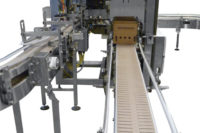Deacom ERP system includes inventory, quality control enhancements
Deacom Inc. has released the latest version of its Deacom Integrated Accounting and Enterprise Resource Planning (ERP) Software System for food and beverage manufacturers, rolling out significant enhancements to the integrated ERP system’s material requirements planning (MRP) and quality control (QC) capabilities.
Deacom Inc. has released the latest version of its Deacom Integrated Accounting and Enterprise Resource Planning (ERP) Software System for food and beverage manufacturers, rolling out significant enhancements to the integrated ERP system’s material requirements planning (MRP) and quality control (QC) capabilities.
Deacom 10.4 builds upon the software’s established functionality, which encompasses all the business processes of a food and beverage manufacturer, from sales and purchasing to production, reporting and accounting.
Now the integrated ERP system combines sales and production MRP data in one easy-to-read report. Manufacturers can view current or time-phased material requirements for their entire organization – including on-hand inventory, issued and reserved inventory, items in QC hold, job requirements, sales requirements not yet scheduled as jobs, pending purchase orders, forecasts and inter-company transfers – from a single screen.
“So if you need it, you see it,” explains Deacom Implementation Specialist Paul Heinmiller. “This improvement will give users better data visibility so they can make better planning and purchasing decisions.”
The MRP software functionality also lets users satisfy material shortages by creating production jobs, POs and inter-company transfers directly from the MRP report. Users buying several different parts from the same vendor also can build a multiple-item PO directly from this screen. And built-in drill down capability lets users view the real-time detail behind any MRP quantity by double-clicking the number.
In addition, Deacom 10.4 includes improved QC capabilities. Now manufacturers can perform production QC testing during the job cycle – running multiple passes until achieving the desired test results – or after production is complete, on a pass/fail basis. “The addition of post-production QC makes the system more flexible,” Heinmiller says. “It’s particularly helpful for manufacturers using third-party testing services.”
Deacom continues to permanently store all QC data for extensive research and reporting.
Deacom Inc.
610/971-2278
www.deacom.net
Deacom Inc. has released the latest version of its Deacom Integrated Accounting and Enterprise Resource Planning (ERP) Software System for food and beverage manufacturers, rolling out significant enhancements to the integrated ERP system’s material requirements planning (MRP) and quality control (QC) capabilities.
Deacom 10.4 builds upon the software’s established functionality, which encompasses all the business processes of a food and beverage manufacturer, from sales and purchasing to production, reporting and accounting.
Now the integrated ERP system combines sales and production MRP data in one easy-to-read report. Manufacturers can view current or time-phased material requirements for their entire organization – including on-hand inventory, issued and reserved inventory, items in QC hold, job requirements, sales requirements not yet scheduled as jobs, pending purchase orders, forecasts and inter-company transfers – from a single screen.
“So if you need it, you see it,” explains Deacom Implementation Specialist Paul Heinmiller. “This improvement will give users better data visibility so they can make better planning and purchasing decisions.”
The MRP software functionality also lets users satisfy material shortages by creating production jobs, POs and inter-company transfers directly from the MRP report. Users buying several different parts from the same vendor also can build a multiple-item PO directly from this screen. And built-in drill down capability lets users view the real-time detail behind any MRP quantity by double-clicking the number.
In addition, Deacom 10.4 includes improved QC capabilities. Now manufacturers can perform production QC testing during the job cycle – running multiple passes until achieving the desired test results – or after production is complete, on a pass/fail basis. “The addition of post-production QC makes the system more flexible,” Heinmiller says. “It’s particularly helpful for manufacturers using third-party testing services.”
Deacom continues to permanently store all QC data for extensive research and reporting.
Deacom Inc.
610/971-2278
www.deacom.net
Looking for a reprint of this article?
From high-res PDFs to custom plaques, order your copy today!





